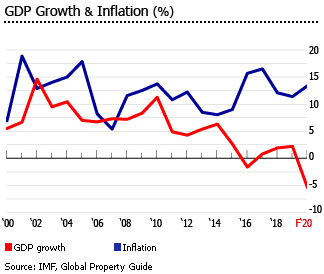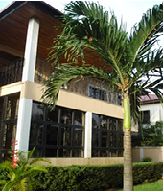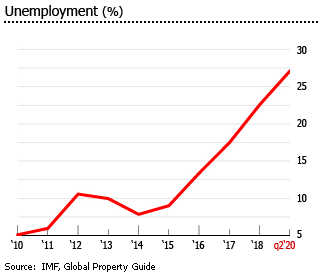2019 was a great year for Nigeria’s housing market, with demand rising by double-digit figures.Property listing enquiries surged 72%, according to a year-ender report by Nigeria Property Centre.
However due to the pandemic, demand suddenly slowed this year. Job losses and salary cuts have prevented many from renting better apartments or purchasing new homes, note PropertyPro.ng. Estate Intelconfirms that “many payment plans for properties are being extended”.
Despite this, local real estate experts remain optimistic. “A section of the workforce who now work remotely may have an increased need for larger spaces,” said PropertyPro.ng. “Specifically for millennials looking for improved privacy, the need for new apartments will probably surface.”
In an effort to buoy economic activity amidst the pandemic, the Central Bank of Nigeria (CBN) recently approved NGN 200 billion (US$ 520 million) in mortgage finance to fast track construction of 300,000 social housing units for low-income households, and to create new jobs for the unemployed.

In Q2 2020, Nigeria’s economy shrank by 6.1% from a year earlier, in contrast to a 1.9% growth the previous quarter, amidst subdued domestic and international economic activity due to the nationwide shutdown measures aimed at containing the pandemic, according to the National Bureau of Statistics. It was the steepest decline since Q1 2004. The International Monetary Fund (IMF) recently revised down its 2020 economic forecast for Nigeria to a contraction of 5.4%, worse than its earlier estimate of -3.4%.
Analysis of Nigeria Residential Property Market »Rental Yields
Nigerians are turning to rented accommodation
The Lagos Island market has experienced continuous rises in average asking prices over the last three years, with surging demand for luxury houses, particularly from investors and high-income individuals. The Lagos mainland, on the other hand, exhibited marginally decreasing prices in 2013.
Asking rents have been rising. After a lackluster year in 2011 asking rents in both the Lagos markets bounced back in 2012 with double-digit growths.
While asking rents are much higher on the Lagos Island, rental yields are generally higher in the mainland due to the surging prices in the island market. Yields are moderate at 4.3% for the Lagos Mainland and 3.64% for the Lagos Island.
Read Rental Yields »Taxes and Costs
Rental income tax is low
Rental Income: For nonresidents, gross rental income earned from leasing out real property is taxed at a final withholding rate of 10%.
Capital Gains: Capital Gains tax is levied at a rate of 10% on the gains realized from the disposal of real property. Property acquisition costs and incidental costs in transferring property ownership (i.e. stamp duty, professional costs, and advertising) are deductible.
Inheritance: There are no inheritance taxes in Nigeria.
Residents: Residents are taxed on their worldwide income at progressive rates, from 7% to 24%.
Read Taxes and Costs »Buying Guide
Very high costs, corruption-prone system
The total roundtrip transaction cost is around 27.60% to 31.275%. This includes several permits, fees and charges.
The biggest cost is the 8% consent fee paid to the state government. This seems to be a screening mechanism for collecting bribes. There is also a registration fee of 3%, paid by the buyer.
Read Buying Guide »Landlord and Tenant
Strongly pro-landlord rental market
 Nigerian rental market practice is extremely favorable to the landlord.
Nigerian rental market practice is extremely favorable to the landlord.
Rent: Rents are freely determined; the Rent Control Law of Lagos is not implemented. Rents are paid well in advance, for two to three years.
Tenant Eviction: Because the court system is cumbersome and expensive, most landlords prefer to evict tenants using an assortment of tricks, phony legal cases, intimidation, locking out tenants or physically throwing them out of the unit.
Read Landlord and Tenant »ECONOMIC GROWTH
Struggling economy, surging unemployment
In Q2 2020, Nigeria’s economy shrank by 6.1% from a year earlier, in contrast to a 1.9% growth in the previous quarter, amidst subdued domestic and international economic activity due to the nationwide shutdown measures aimed at containing the pandemic, according to the National Bureau of Statistics. It was the first decline since Q1 2017 and the steepest since Q1 2004.
On a quarterly basis, Nigeria’s GDP contracted by 5% in Q2 2020, following a 14.3% plunge in the previous quarter.
The oil sector declined by 6.6% y-o-y in Q2 2020, following a 5.1% growth in Q1, amidst lower crude oil production. Similarly, the non-oil sector recorded a decline of 6.1%, as the coronavirus crisis hit critical activities such as transportation, food services, construction and internal trade.
Nigeria’s economy grew by 2.2% in 2019, an improvement from expansions of 1.9% in 2018 and 0.8% in 2017 and a contraction of 1.6% in 2016, buoyed by improvements in manufacturing and services, as well as a recovery in the oil sector.
Recently, the International Monetary Fund (IMF) revised down its 2020 economic forecast for Nigeria to a contraction of 5.4%, worse than its earlier estimate of -3.4%, amidst larger-than-expected disruptions to global value chains due to the pandemic.
Unemployment is rising sharply. In Q2 2020, the overall unemployment rate stood at 27.1%, the highest level on record. It was the first time since 2018 that the country’s National Bureau of Statistics published such figures. Unemployment averaged just 8.8% from 2010 to 2016, before rising to 13.4% in 2017 and 22.6% in 2018, according to the IMF.
Youth unemployment was very high, at 34.9% in Q2 2020.
In August 2020, inflation stood at 13.22%, the highest level since March 2018, as food prices surge amidst the COVID-19 pandemic, based on figures from the NBS. After an annual average of 10% from 2006 to 2015, inflation climbed to almost 14% every year from 2016 to 2019.
“Specifically, headline inflation is expected to hover around 13.97% and 14.15% at end-December 2020,” said the country’s central bank, due to food supply shocks that may occur emanating from a decline in economic activities worldwide and from domestic and international lockdowns.
To alleviate the situation, the government approved a stimulus package worth NGN 2.3 trillion (US$ 6 billion) in June 2020 to support the most vulnerable sectors adversely impacted by the coronavirus outbreak. Earlier, Nigerian President MuhammaduBuhari signed an ambitious budget into law, amounting to a record NGN 10.8 trillion (US$ 28.2 billion), in an effort to boost the economy and increase its expenditure on security to help the government combat rising militancy and kidnapping across the country.
Buhari won a second term in the February 2019 elections, defeating his pro-business rival AtikuAbubakar who had pushed for privatizations and a shift towards a free-floating exchange rate regime.



